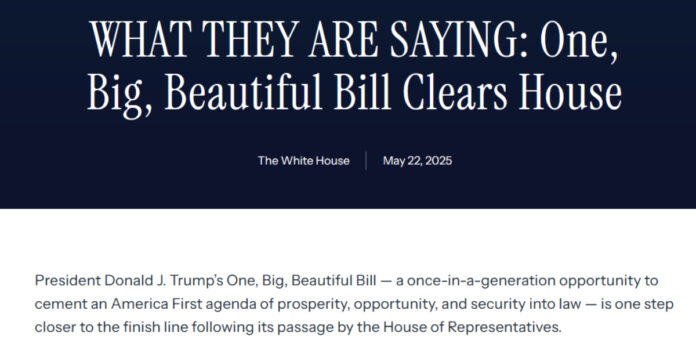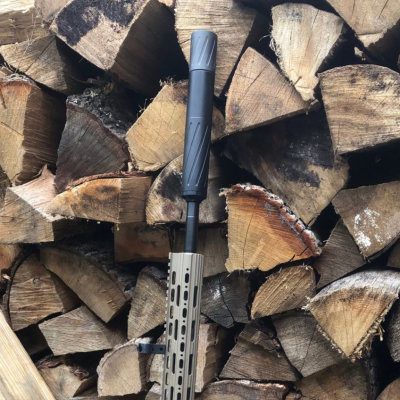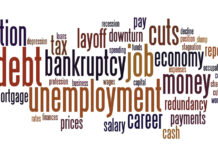
The so-called “Big Beautiful Bill” passed the house Thursday morning and is headed to the Senate, where there will be more horse trading before it likely passes the Senate and then goes into reconciliation. It will take another five or six weeks to wind its way through the process and land on President Trump’s desk for his signature.
Is this bill a good thing, a bad thing, or neither? And what does it mean for preppers?
Market Reaction
On Thursday, the market was pretty flat, probably because the passage was no surprise.
Gold and silver are heading up again. Bitcoin is trading at record highs of $110,000. Earlier this week, bonds were punished as an ugly auction of U.S. treasuries sent interest rates higher. That, in turn, will drive up the interest rate on mortgages and car loans. CD rates may also increase, but who has money to put into CDs? Not most Americans.
It appears the new tax bill, which raises the spending limit by $4 trillion, may spook other markets. Optimism is being replaced by fear, uncertainty, and doubt, meaning no one wants to buy U.S. Treasuries without earning at least 5 percent interest. While everything being hunky dory two weeks ago, the financial markets may be running scared again.
The recent news that Israel may strike Iran has spooked the oil market. The recent killing of two Israeli diplomats in Washington both adds fuel to that fire and gives us insight on what the streets here could look like if Israel attacks Iran and if Iran activates its sleeper cells.
My Thoughts on the Bill
My chief thought about the bill is the changes we need to accomplish to put the United States back on a sound financial footing are too big to be encompassed in a single bill, no matter how big or beautiful it is. This kind of turnaround would require both parties to cooperate, and that doesn’t happen very often, especially when there is so much distance between the far right and far left.
Second, there are some specific parts of the bill that please me. For example, as someone who is not yet old enough to collect Social Security but will be doing so in the next decade, I am pleased that I will get a deduction to offset any taxes I would have to pay on my Social Security income. I’m also happy tipped workers and people who get overtime will get similar tax relief.

I am also very pleased that the Hearing Protection Act, which removes suppressors (also known as silencers) from the National Firearms Act (NFA), is currently in the bill. This means if you can legally buy a gun, you will be able to walk into a gun store and buy a suppressor without the need to register it with the federal government or to pay the $200 tax. Sadly, the Short Act, which removes short-barreled rifles from the NFA, was not in the final bill. If passed, we could all legally put a real stock on our AR pistols instead of an arm brace. We’ll have to wait and see if the senate adds it back in.
And finally, I’m happy to have the original Trump tax cuts extended. If this bill fails, most of us will pay at least $3,000 more in taxes next year.
More Thoughts
The bill also removes incentives for electric vehicles, solar power, and other green funding. I’m happy I already claimed this tax credit when we installed our solar system, but I won’t get another credit if I buy another battery or install a more efficient hot water heater in the future. I can live with that. The removal of tax incentive for EVs is also fine with me. I think they will be universally adopted when the technology is as good or better, and as cost effective, as internal combustion engines. Let the free market be free.
I think the solution to high spending is not more taxes but is less spending, and that’s where the bill fails. Some things were cut back, but they were offset with new spending to fund Trump’s priorities. This won’t reduce the deficit. Trump’s plans to make government smaller might help, but not by much.
If you look at the above list of things I like, you’ll see that most of them save me money by lowering my taxes. Like most Americans, I am judging the bill by what is in it for me, not whether it will make our country a better or safer place, or one less likely to experience a financial collapse. People who want free healthcare, more food stamps or SNAP, and programs that benefit them are no different than folks who want lower taxes. And that’s why we are in this financial morass. Our politicians give us gifts so we keep voting for them. It would be better if they voted for the good of the country, not the good of their constituents. That might have been more likely, at least in the senate, when senators were appointed by the state government rather than elected by the people.
Ramifications for Preppers
What does this bill mean for preppers? Not much. Like me, you may save a few bucks and can buy some more preps, but I think that value is offset by it not doing anything to stabilize the country long term. I think we are inching closer to an economic calamity. Whether it will be massive—but not quite hyper—inflation or a default and subsequent collapse of the dollar remains to be seen. Either way, you need to prep not just for natural disasters, but for the day when the dollar either dies or becomes virtually worthless.
Something that cost you $1 today could be had for less than a nickel in 2025. That kind of drop in value took 100 years, but imagine if happened in four of five? If we have double-digit inflation for a few years, a $50 restaurant meal today might cost you $150. Hyperinflation is worse and could make it cost $1,500. With runaway hyperinflation, that same dinner could cost $1.5 billion.
You may think this sounds ridiculous or could never happen, but it has. In the Weimar Republic, a loaf of bread that in 1920 cost 150 German marks cost 200 billion marks just three years later. And that kind of inflation didn’t just happen 100 years ago. In 2021, I wrote about how Venezuela cut six zeros off its currency. In other words, if you took a $1 million bill to the bank, they would take it and give you a $1 bill in the new, revalued currency. That’s how bad inflation can get. It will wipe away your wealth, but also government debt.
That’s why our government, which owes $37 trillion, likes inflation. If they could chop off six zeros, the debt would be only $37 million.
Buy and Hold Goods to Minimize Inflation’s Impact
Are we there yet? Of course not. But that might kind of inflation might not be so far in our future as we’d like. Mortgage rates are back up to 7 percent. What will happen when they are 17 percent? Or, God forbid, 70 percent?
This is why it is important to own your house, so you don’t have to worry about mortgage rates or rising rents. It’s also why the price of gold is going up. It will have value even if the dollar doesn’t. Having food in your prepper pantry can help you survive when prices jump. Salaries may follow, but there is always a lag time.
You may also want to own some crypto currency, so you can buy something without resorting to dollars. Goods may be priced in tiny fractions of a made-up coin that exists only in the cloud and the minds of people who agree it has value. Does that concept sound crazy? Perhaps, but no crazier than a piece of paper that is worth $100 because a government says it is. Physical assets will keep their value throughout inflation. Physical assets that produce income, such as rent or farm produce that can be sold or traded, are even more valuable. They will not only help you preserve your wealth, they will generate income when you need it most.
The only thing I see preventing this eventual financial collapse is war. War would probably no doubt be worse, or at least harder to recover from, but we don’t get to pick which is the lesser evils. We need to prepare for both.






